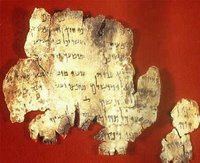Qumran and predestination (I)
I asked Chris Petersen from Resurrection Dogmatics to write a guest-post for us here about the doctrine of “double predestination” in the Qumran community, and Chris kindly agreed. So here is the first of Chris’s two posts on the topic: Contrary to popular opinion, the doctrine of double predestination goes back further than Augustine. It can be found already in the Qumran community (3rd century BCE to 1st Century CE). This community was predominately composed of a Jewish sect known as the Essenes, who authored many of the Dead Sea Scroll documents.
Contrary to popular opinion, the doctrine of double predestination goes back further than Augustine. It can be found already in the Qumran community (3rd century BCE to 1st Century CE). This community was predominately composed of a Jewish sect known as the Essenes, who authored many of the Dead Sea Scroll documents.
One of the recurring themes that struck the scholars translating these documents was the emphasis on God's unilateral providence and double predestination. Apparently, the Essenes were well known for their distinctive view of providence; the early Jewish historian Josephus noted: “The sect of the Essenes … declares that Fate is mistress of all things, and that nothing befalls men unless it be in accordance with her decree” (Antiquities 13.171-73). The theological content discovered in the Dead Sea Scrolls substantiates Josephus’ statement. Here are a few passages from the Dead Sea Scrolls:
“Before things come to be, [God] has ordered all their designs, so that when they do come to exist—at their appointed times as ordained by His glorious plan—they fulfill their destiny, a destiny impossible to change…. He created humankind to rule over the world, appointing for them two spirits in which to walk until the time ordained for His visitation. These are the spirits of truth and falsehood. Upright character and fate originate with the Habitation of Light; perverse, with the Fountain of Darkness…. It is actually He who created the spirits of light and darkness, making them the cornerstone of every deed.” (1QS 3.15-19, 24-25)
“I know that the inclination of every spirit is in your hand; you did establish all its ways before ever creating it, and how can any man change your words? You alone created the just and established them from the womb for the time of goodwill … but the wicked you did create for the time of your wrath, you vowed them from the womb for the Day of Massacre, for they walk in the way that is not good.” (1QH 15.13-14, 16-17)
“And you, O God, created us for yourself as an eternal people, and into the lot of light you cast us for your truth. You appointed the Prince of Light from old to assist us, for in his lot are all sons of righteousness and all spirits of truth are in his dominion. You yourself made Belial for the pit, an angel of malevolence, his dominion is in darkness, and his counsel is to condemn and convict.” (1QM 13.9-11)
One of the peculiarities that you'll notice here is the notion of two different types of spirits created by God, usually described as “light” and “darkness.” Further, some of these passages indicate that God decided which spirit to assign to each person. Though they didn't use normal predestinarian language, it seems that the Essenes held to a strong form of determinism—so strong that it determined who would be righteous (a son of the light) and who would be wicked (a son of the darkness).







This information should be very interesting to readers of N.T. Wright's Christian Origins and the Question of God series. In The New Testament and the People of God Wright argues that Josephus' description of the belief of certain Jewish sects (I forget if he mentions the Essenes specifically) in free will is not acually referring to this hellenistic philosophy, but rather is code for whether they believed that the Jews should take matters into their own hands and try to rid themselves of Roman oppression or should simply wait for God to intervene on their behalf. This information seems to contradict that claim. I absolutely love Wright's work, but I appreciate seeing evidence that points in other directions because it keeps me honest. Thanks! :)
Post a Comment